Small business owners face numerous challenges on their path to success, and while they strive to overcome obstacles and thrive in their respective industries, unforeseen events can pose a threat to their hard-earned achievements. This is where small business insurance steps in as a crucial safeguard, offering protection against potential risks and providing peace of mind for entrepreneurs. Understanding the ins and outs of insurance coverage is vital for every small business owner, as it can make a significant difference in times of crisis. From protecting your business assets to ensuring the well-being of employees, having the right insurance policies in place can help weather any storm that comes your way.
One aspect of small business insurance that often gets overlooked is the need for comprehensive coverage for vehicles used for business purposes. Whether you own a single company car or operate a fleet of vehicles, having the right car insurance can save you from potentially devastating financial losses. Accidents on the road can happen when least expected, and having proper coverage not only protects your valuable assets but also extends to the potential medical costs and liability associated with any unfortunate incidents. This is why it is essential to explore the different options available and choose a car insurance policy tailored to your specific business needs.
While many small business owners might think that insurance is an unnecessary expense that only adds to their financial burden, in reality, it can be a lifeline in times of crisis. Small business insurance provides protection against a range of risks, including property damage, liability claims, and even legal disputes. By investing in comprehensive coverage, business owners can safeguard their hard work, ensuring that even in the face of unforeseen events, their success remains intact. From protecting physical assets to mitigating financial losses, having the right insurance policies in place allows entrepreneurs to focus on what they do best – running their businesses efficiently and confidently.
Remember, insurance is not just a safety net, but an essential tool that contributes to the long-term sustainability and growth of your small business. By understanding the different types of coverage available and seeking guidance from insurance professionals, you can navigate the intricate world of small business insurance and make informed decisions to safeguard your success.
Types of Small Business Insurance
Running a small business comes with its fair share of risks. From accidents to unforeseen financial losses, it is crucial to protect your hard work and investments with the right insurance coverage. Small business insurance is designed to shield business owners from various vulnerabilities. Let’s explore some key types of small business insurance that you should consider:
-
General Liability Insurance: General liability insurance is a fundamental coverage that every small business should have. It protects your business from third-party claims related to bodily injury, property damage, or advertising mistakes. This insurance ensures that you are financially protected if someone sues your business for accidents that occur on your premises or due to your operations.
-
Professional Liability Insurance: Professional liability insurance, also known as errors and omissions insurance, provides coverage for businesses that offer professional services. It safeguards your business from claims of negligence, errors, or omissions in the services provided by you or your employees. This insurance is particularly crucial for professions such as doctors, lawyers, consultants, and architects, where mistakes can have significant consequences.
-
Commercial Property Insurance: If you own or lease a physical location for your small business, commercial property insurance is essential. It protects your building, equipment, inventory, and other physical assets against unexpected events like fire, theft, or vandalism. With this insurance, you can recover financially and get your business up and running again after a covered loss.
Remember, these are just a few types of small business insurance options available. It’s important to assess your specific risks and consult with an insurance professional to determine the right coverage for your business. By safeguarding yourself with the appropriate insurance policies, you can focus on growing your business without unnecessary worries.
Understanding Car Insurance for Small Businesses
Car insurance plays a crucial role in protecting small businesses from financial risks associated with owning and operating vehicles. Whether you have a single company car or an entire fleet, having the right car insurance coverage is essential. In this section, we will explore the key aspects of car insurance for small businesses.
First and foremost, it’s important to understand that personal car insurance policies typically do not cover vehicles used for business purposes. As a small business owner, you need to ensure that your vehicles are adequately covered under a commercial car insurance policy. This type of insurance provides the necessary protection for both owned and leased vehicles used in your business operations.
When selecting car insurance for your small business, you should consider the specific coverage options that best suit your needs. Liability coverage is one of the most essential components, as it protects you in case of accidents where your business vehicle is at fault. This coverage helps to pay for damages to other vehicles or property, as well as any resulting medical bills or legal expenses.
In addition to liability coverage, comprehensive and collision coverage are also worth considering. Comprehensive coverage protects your vehicles against damage from events such as theft, vandalism, or natural disasters. Collision coverage, on the other hand, covers damages to your vehicles resulting from collisions with another vehicle or object.
Understanding the different coverage options and their importance is crucial for small business owners who rely on vehicles as part of their operations. By having the right car insurance in place, you can safeguard your business from the potentially devastating financial consequences of accidents and other unexpected events.
Tips for Choosing the Right Insurance Coverage
When it comes to protecting your small business, having the right insurance coverage is essential. Here are some valuable tips to consider when choosing the right insurance for your company:
- Assess Your Business Needs:
Before diving into the world of insurance policies, take some time to carefully assess your specific business needs. Every small business is unique, so it’s important to understand the risks and liabilities that are specific to your industry. Consider factors such as the size of your team, the nature of your products or services, and any potential risks involved in your daily operations. By identifying your needs, you can ensure that your chosen insurance coverage will provide adequate protection.
- Research Different Insurance Providers:
With a plethora of insurance providers out there, it’s critical to do your research and compare the options available to you. Look for reputable insurance companies that have experience working with small businesses. Read customer reviews, check their financial stability, and inquire about their claims process. It’s also worth considering whether they have specialized coverage options for your industry. By taking the time to research, you can make an informed decision and choose a provider that meets your specific requirements.
- Understand the Insurance Policy:
Before making a final decision, thoroughly review any potential insurance policy you are considering. Pay close attention to the coverage offered, the limits and exclusions, and the terms and conditions. Take note of any additional endorsements or riders that may be necessary to tailor the policy to your business’s needs. If there are any areas of the policy that are unclear, don’t hesitate to reach out to the insurance provider for clarification. It’s crucial to have a comprehensive understanding of the policy you are purchasing to ensure that it offers the right level of protection for your small business.
By following these tips, you can navigate the complex terrain of small business insurance and make an informed decision that will safeguard your success. Remember, investing in the right insurance coverage is an essential step towards protecting your business and ensuring its long-term stability.


